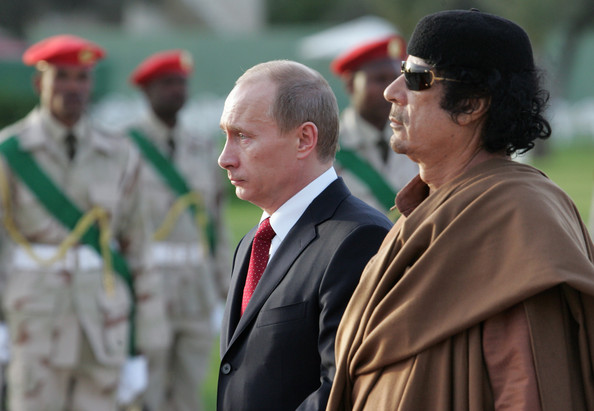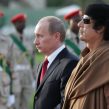
Moscow Responds to the Arab Revolutions: Focus on Libya (Part Two)
Publication: Eurasia Daily Monitor Volume: 8 Issue: 80
By:

The development of the popular uprising in eastern Libya transformed the Arab Revolution from a “spectator sport” for the rest of the world and created real problems for Russian national interests. Russian experts on the Middle East were quick to warn of the dangers of foreign, especially Western military intervention in the case of the unrest turning into a real civil war. Evgeny Primakov, the former head of Russia’s Foreign Intelligence Service, Foreign Minister, and Prime Minister, spoke of the grave risks of miscalculation in the Arab world and the risk of becoming involved in a civil war: “It is important to understand the mentality of the Arab people and the history of the Arab countries… foreign military intervention [in the region] is often counter-productive” (RIA Novosti, February 28).
But Russia itself had a web of interests that it had grown in Libya through deals with the Gaddafi regime and other foreign firms operating there. Just before the outbreak of the fighting, Gazprom acquired 33 percent of the Italian gas company Eni’s share of Libya’s “Elephant oil and gas production field” for $179 million. But the rapid shift from protests to armed clashes between Gaddafi’s forces and the opposition around Benghazi brought a quick decision in Moscow to evacuate technicians from high-profile investment projects in Libya, including railroad specialists and representatives of Gazprom (The Moscow Times, February 22). On April 7, Gazprom announced that it was suspending indefinitely its projects in Libya because of the continued instability there (Kommersant, April 7). The Russian press, like much of the international media, followed the advance of the rebels from the east towards Tripoli in the west and speculated on the speedy collapse of the regime. But when the fortunes of war began to change and Gaddafi’s forces counterattacked, the mass media in Moscow began to express fears that Western intervention would lead to the collapse of Gaddafi and adversely affect Russian financial interests in Libya, including the Russian arms industry, which had extensive contracts worth more than $2 billion for repair and modernization of Soviet era equipment and for the acquisition of new Russian equipment, including the Su-35 fighter and advanced air defense systems (Nezavisimaya Gazeta, March 1).
But the immediate collapse of Gaddafi did not come and the counter-attacks by his forces swept the ill-armed and untrained rebel forces back in disarray toward Benghazi. In this context the Arab League voted to ask the UN Security Council to impose a “no-fly zone” over Libya. On March 17, the UN Security Council voted to impose a no-fly zone over Libya and to use airpower to protect the civilian population. The real sponsors of the “no-fly zone” were the Western powers of France, Britain, Italy and the United States, which quickly provided air assets to enforce the zone. The Security Council voted 10 members for the resolution and five abstained. Russia and China as permanent members of the Security Council abstained and so did not veto the resolution. These two powers were joined by Brazil, India and Germany in their abstention. The domestic response to these develops reflected divisions with the Russian ruling elite and even within the ruling “tandem.” President Dmitry Medvedev responded to the action by urging the international community to cooperate in ending the conflict but stated: “We will not participate in any of the no-fly zone operations [in Libya], we will not send any troops, if, God forbid, this operation goes on the ground, which I cannot rule out.” He went further and put responsibility for the tragedy in Libya on the shoulders of the Gaddafi government (RIA Novosti, March 21). Prime Minister Vladimir Putin was not positive in his response to the no-fly zone. Speaking at the Votkinsk missile production facility, he characterized the Western military intervention as “deficient” and smacking of “a medieval call to crusade.” Medvedev seemed to respond by stressing his role as “commander-in-chief” and warned against ill-considered remarks by unnamed politicians who might by such remarks provoke a “conflict of civilizations” (RIA Novosti, March 22).
Russian foreign policy experts took a different approach on the abstention in the Security Council. Russia had managed to secure critical international solidarity for its position by mobilizing BRICS plus Germany to abstain. Brazil, Russia, India and China have advocated a concept associated with multi-polarity and a balancing act against US-led Western hegemony. In this case Germany, one of the key members of the NATO Alliance, led by a conservative-centrist government had joined the four. Konstantin Kosachev, a former diplomat and Chair of the Committee of International Relations of the State Duma, depicted the Russian position on the no-fly zone as faithfully reflecting Russian interests, even if it exposed traditional divisions among the Russian elite between those who see the West as a partner or as an enemy. These prisms ignored the real content of the abstention, which demonstrated a solid foundation for a multi-polar order based on prudence in crisis situation. Kosachev emphasized that Russia by abstaining:
…managed to avoid a confrontation with the Muslim world (the resolution was initiated by the Arab league). Like other BRICS states and Arab countries, Russia is in the position now to demand exact observance of provisions of Resolution 1973 from whoever voted for it – without sharing responsibility for its political consequences with them (Rossiyskaya Gazeta, March 25).
Unlike the situation in 1999, when Russia stood alone opposing NATO’s air intervention against Yugoslavia, this time Russia had other regional powers which stood with it, including a NATO member (Germany). The US quickly moved to put the no-fly zone under NATO direction, and NATO tried to resolve the rift created by Germany’s abstention to the Security Council resolution authorizing the no-fly zone. But almost one month has passed and the no-fly zone has not brought either the political or military results that its authors envisioned. Now the allies against Gaddafi are moving to send aid and advisors to the rebels, inching closer to joining the ground war against Gaddafi.
Great revolutions have ways of reshaping things beyond the immediate territories involved. In this case the Great Arab Revolution has, from Moscow’s perspective, confirmed the end of the unipolar international order and the emergence of multi-polarity. The subsequent conversations between President Obama and Medvedev do seem to suggest that both would like a political solution leading to Gaddafi’s departure but with minimum loss of life among the Libyan population. But as the no-fly zone has failed to tip the military balance against Gaddafi and as some states have moved toward over military assistance on the ground to give the rebels the means to defeat Gaddafi’s forces, the question remains just how the Great Arab Revolution will turn out in Libya and whether international intervention will bring a solution or open the road to a bloody and protracted civil war. Meanwhile, the Great Arab Revolution has lit fires elsewhere with a kaleidoscope of effects with still undetermined consequences.
The Russian reading of this situation has been one of increasing alarm. As a regular feature, Kommersant publishes a weekly index of international security. Since the onset of the Arab Revolution that index had fallen steadily. On April 19, it reached 2,784. The author looked at the continuing and spreading unrest and fighting in the Middle East to explain its decline. The situation in Libya received primary attention. The continuing heavy fighting between the Gaddafi forces and the rebels enjoying NATO’s air support has become a stalemate. The article depicted the human tragedy in Libya’s embattled cities as horrific. It also noted rising tensions in Syria where the opposition is demanding the departure of Syria’s President, Bashar al-Assad, and continued unrest in Iraq, Bahrain, Jordan, Saudi Arabia, and Yemen (Kommersant, April 19).




